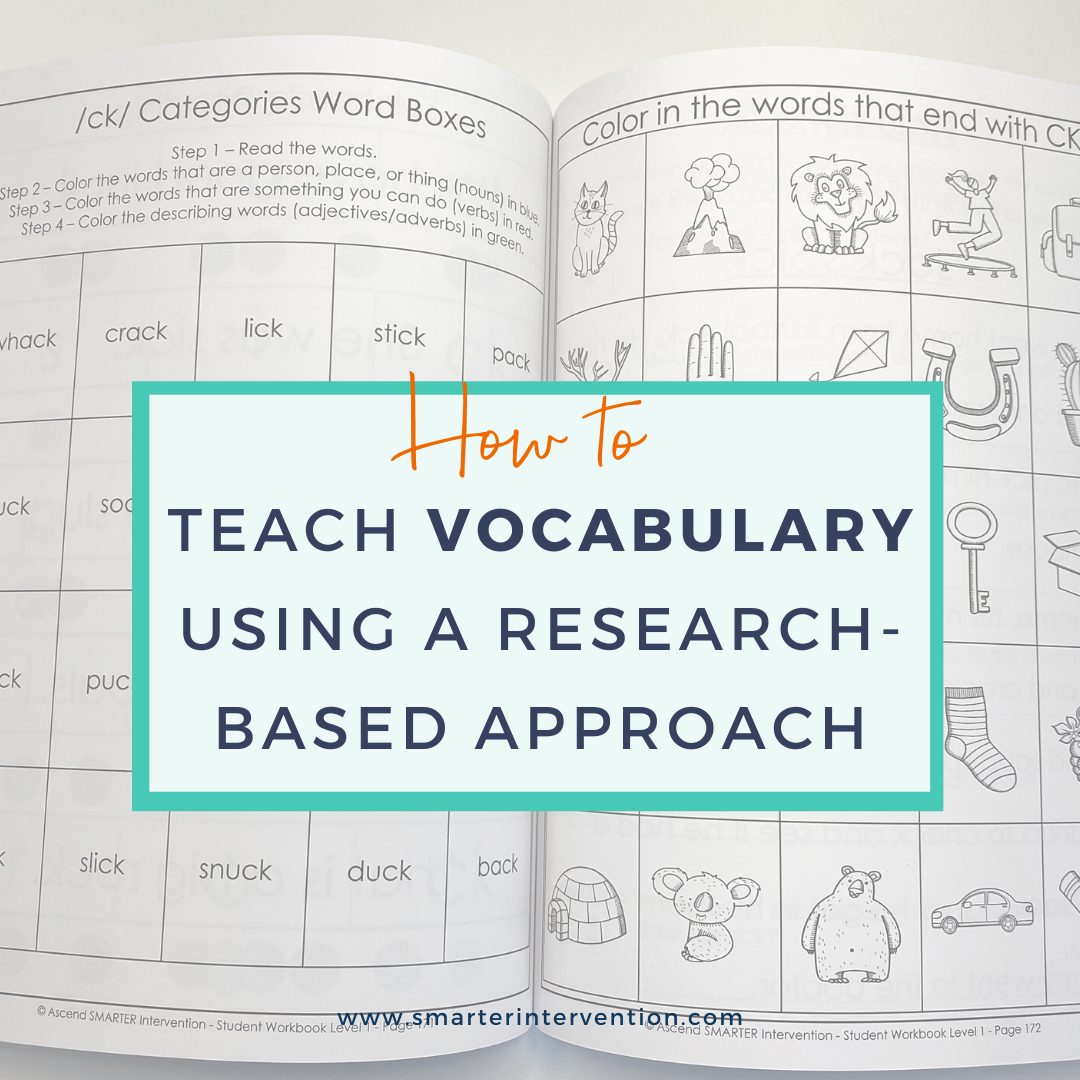Science-based literacy resources and articles
for families, educators and schools
Search by Category:
Categories
- Advocacy
- Authentic Literature
- Business
- Comprehension
- Data Tracking
- Differentiation
- Dyslexia
- Evaluation and Assessment
- Executive Functioning
- Games & Activities
- Helping My Child At Home
- How To
- IEP/504 Plan
- Lesson Planning
- Math
- Online Intervention
- Organization
- Parents
- Phonics
- Phonological Awareness
- Reading Comprehension
- Reading Fluency
- Research
- SLP
- Spelling
- Vocabulary
- Writing
Should I Teach Syllable Segmenting?
Can you spell supercalifragilisticexpialidocious? Can your students?
In all seriousness, supercalifragilisticexpialidocious isn't the most functional word to spell – but as students progress academically, they do need to be able to break down long words for reading and spelling. Keep reading to learn why syllable segmenting is necessary and how to incorporate this instruction into your lessons!
How to Teach Vocabulary using a Research-Based Approach
When I started out in reading intervention - the thought of teaching vocabulary terrified me. Maybe it was because I wasn’t sure how much my students were actually struggling with it, I wasn’t sure how to assess it, I wasn’t sure how much of it fell on me to teach, maybe it was because I thought it was just morphology, or - maybe it was because I still remember how much I hated memorizing hundreds of definitions & word origins from when I was in school.
Whatever it was - I dreaded vocabulary because it felt overwhelming and the way I was taught when I was a student (find the part of speech, word origin, and definition) never seemed to be helpful - just tedious.
That is until I learned what vocabulary instruction should actually look like and why it is so important. Today - we are going to break that down.
The Reason 66% of Students Aren't Reading on Grade Level
When we discussed this statistic with the team - it got heated. If you know us at all, then you know that we believe every child deserves success and the fact that two-thirds of them are not able to access grade-level materials is gut-wrenching. We did some digging and realized that the reason that 66% of 4th-grade students are not reading at grade level is that…
Why Are We Doing This in Literacy Intervention?!?
We know that we have a massive reading gap for so many students…
Knowing what we know - we keep questioning -
Why do we have so many struggling students when the research is clear on what evidence-based practices MUST look like to support our struggling readers?
Ultimately, there are a LOT of potential answers and factors at play when we consider this question but for us, it really comes down to 3 major categories. And…because we always teach our students to use graphic organization strategies to make sense of and organize information, we felt compelled to do the same!
What is the Most Important Thing I can do to Support a Struggling Student?
When students are struggling - it’s hard to know where to start and what the most important steps are in providing support to get them to where they need to be.
After working with hundreds of students, and evaluating thousands of students, we’ve realized that the most important thing that parents and educators can do to support struggling students actually has nothing to do with intervention or tutoring, accommodations, modifications, IEP or 504 Plans…
The Realistic Approach to Being the Best Resource for Your Students
If you are reading this, we want to thank you for caring so much about your students. Thank you for caring enough to be curious about how you can be the best resource for them. Thank you for putting in the time and the hard-work.
What Research Tells Us About Supporting Our Students
One of the things we hear over and over is that we need to be using evidence-based practices in intervention. We are told that using evidence-based intervention is critical to student success. I am suer that you have heard not to use resources that aren’t evidence based.
But what does that even mean?
Explicit Instruction of Comprehension Strategies for Struggling Readers By Joan Sedita
There are a variety of reasons why students struggle to develop reading and writing skills, and many of these students need explicit instruction in foundational skills such as phonics for decoding and spelling, automatic fluent reading skills, and basic text structures.
How Do I Pick Relevant Activities for My Reading Intervention Students?
So this can be one of the most challenging things we face as reading interventionists - what activities do I pull to target specific weaknesses for my struggling readers? And how can I do that without spending a TON of extra time that I don’t really have?
We all want the very best for our students, it’s our mission and our goal to be providing the best possible instruction to help completely eliminate reading and spelling gaps.
3 Easy Steps to Make This School Year the Best One Yet
It's that time of year again! Time to go back to school! For some of your kids, this might be an exciting time. They are excited about new teachers and school supplies, and can't wait to see their friends again.
For other kids, this may seem like the worst time of year. They might be anxious about the amount of work they will have this year, or having a new teacher.
Helping Your Students Regulate Their Emotions
Discover effective strategies to support students struggling with emotional regulation in the classroom. Learn how to help them name their feelings, communicate appropriately, and regulate emotions positively. Empower your students for success!
A Letter to Teachers about Their "Troublemaker"
Understand the struggles of that one troublesome student in your class. Discover how Executive Functioning (EF) challenges manifest as disruptive behaviors and learn how to support students with EF difficulties. Reach out for guidance and celebrate the end of another school year!
Phonemic Awareness & Phoneme Segmenting for Older Students
We know the importance of phonemic awareness for our young students - but we absolutely cannot forget about this literacy skill when it comes to working with our older students!
My Child is Struggling, But Everyone Says He is On Grade-Level...
Is your child in the gray area?
“She has trouble spelling and reading fluently, but she’s doing okay for the most part
“He’s about a year behind, but don’t worry, it will click soon…”
“She has a hard time with reading grade level text, but she is fine compared to other kids in her class who struggle so much more…”
“I understand he has a diagnosis of dyslexia, but he’s not that far behind…”















